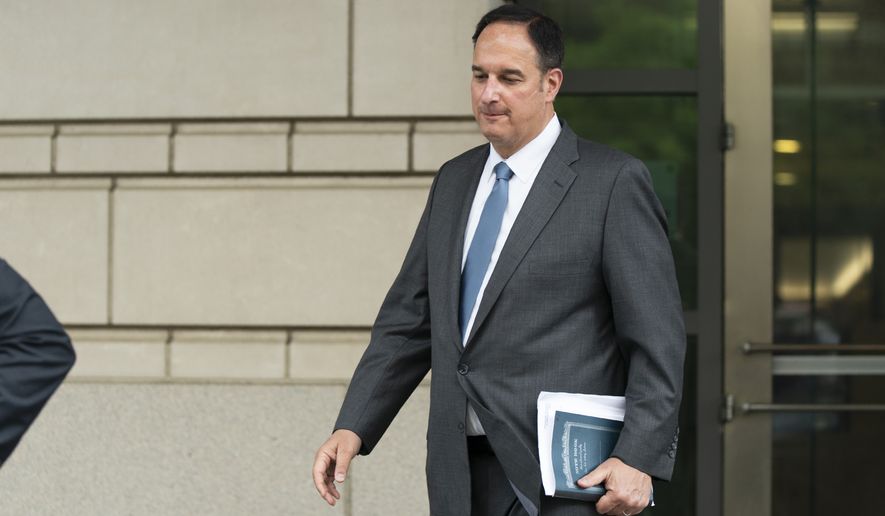Prosecutors with special counsel John Durham’s team rested their case Wednesday against Hillary Clinton campaign attorney Michael Sussmann after presenting the jury with the strongest evidence yet that he lied to the FBI.
They showed the jury Mr. Sussmann’s billing records in which he charged Mrs. Clinton’s 2016 presidential campaign for the time he spent at the FBI peddling a false story about then-candidate Donald Trump’s links to Russia’s Alfa Bank, which has ties to Russian President Vladimir Putin.
The expense reports and billing records were admitted into evidence showing he billed the Clinton campaign for three hours on the day he met with the FBI, though the records did not specify the exact hours when he was working on the campaign’s behalf.
Jurors also saw expense reports reflecting $58.56 billed to the Clinton campaign for thumb drives on Sept. 13, 2016 — six days before he presented the FBI with anti-Trump accusations detailed on two thumb drives. However, the receipt reflected that he bought multiple thumb drives that day, raising the question of whether they were all billed to the Clinton campaign.
Still, the stunning disclosures in federal court in the District of Columbia put Mr. Sussmann’s legal team on the defensive. Sussmann attorney Sean Berkowitz signaled that his client may take the stand Thursday to explain the billing records, a strong indication that his team is worried about the impact of the evidence on the jury.
Mr. Berkowitz said he is waiting on a decision from U.S. District Judge Christopher R. Cooper about whether prosecutors can be barred from asking Mr. Sussmann about his efforts to persuade the Justice Department to drop the case before he was indicted.
Mr. Sussmann is charged with lying to the FBI by telling top bureau lawyer James A. Baker during a Sept. 19, 2016, meeting that he was not working on “behalf of any client” when he pitched a false theory claiming the Trump Organization’s computer servers were secretly communicating with Russia’s Alfa Bank.
Prosecutors say Mr. Sussmann met with the FBI on behalf of the Clinton campaign and technology executive Rodney Joffe in a bid to sabotage Mr. Trump’s campaign.
Defense attorneys argue that Mr. Sussmann came to the FBI on his own as a good citizen. They also say Mr. Sussmann’s ties to Mrs. Clinton’s campaign and the Democratic National Committee were well known to the FBI and Mr. Baker.
It is the first trial stemming from Mr. Durham’s probe of the origins of the FBI’s investigation of Trump-Russia collusion.
The prosecution’s final witness, Kori Arsenault, a paralegal with the Durham team, walked jurors through a complex web of billing records, expense reports and emails that they say show Mr. Sussmann was on the clock on the same day he met with the FBI.
Ms. Arsenault showed jurors a bill dated Sept. 19, 2016 — the day Mr. Sussmann met with Mr. Baker — in which Mr. Sussmann billed the Clinton campaign for three hours for “work and communications regarding a confidential project.”
Evidence introduced earlier in the criminal trial showed Mr. Sussmann referred to his pursuit of a false theory tying Mr. Trump to Russia as “a confidential project.”
She also presented jurors with the expense report for the multiple thumb drives.
Defense attorney Michael Bosworth countered by highlighting another expense from Sept. 19 — taxi fares to and from the FBI totaling $28 — that he billed to his then-law firm, Perkins Coie, rather than the Clinton campaign.
Mr. Bosworth also downplayed the billing entry for Sept. 19 because it doesn’t say anything about the FBI. He noted that other entries in Mr. Sussmann’s billing records explicitly identified meetings at the FBI for the Clinton campaign.
Prosecutors’ final piece of evidence was Mr. Sussmann’s testimony to the House Permanent Select Committee on Intelligence in December 2017, when he said his FBI meeting and a February 2017 meeting at the CIA were for a client.
“I think it’s most accurate to say it was done on behalf of my client,” Mr. Sussmann said. He did not say whether the client was the Clinton campaign or Mr. Joffe, who tasked researchers with using the internet to tie Trump campaign associates with Russia. That effort came up with the now-debunked Alfa Bank theory.
After Mr. Durham’s team rested its case, Mr. Sussmann’s defense rushed through a flurry of witnesses, with roughly five testifying in less than three hours.
Tashina Gauhar and Mary McCord, two former Justice Department lawyers who attended a March 2017 briefing to discuss the Alfa Bank allegations, said they had little or no recollection of the session.
Former FBI agent Tom Grasso also took the stand. He said Mr. Joffe had done terrific work helping the bureau with cybersecurity investigations.
However, he acknowledged that Mr. Joffe separately pitched him the Alfa Bank accusations, suggesting that he was desperate for the FBI to probe the false claim.
Mr. Joffe also asked that his name be withheld from the agents already working the Alfa Bank case, Mr. Grasso recalled.
Jurors heard from two character witnesses who hailed Mr. Sussmann’s honesty and credibility.
“He’s an honest, hardworking man of faith. I’ve never had any issues with his character or integrity,” said Jimma Elliott-Stevens, who was an administrative assistant for Mr. Sussmann at the Justice Department.
However, Ms. Elliott-Stevens and another character witness acknowledged that they knew nothing about the case against Mr. Sussmann, nor had they seen any evidence.
• Jeff Mordock can be reached at jmordock@washingtontimes.com.




Please read our comment policy before commenting.